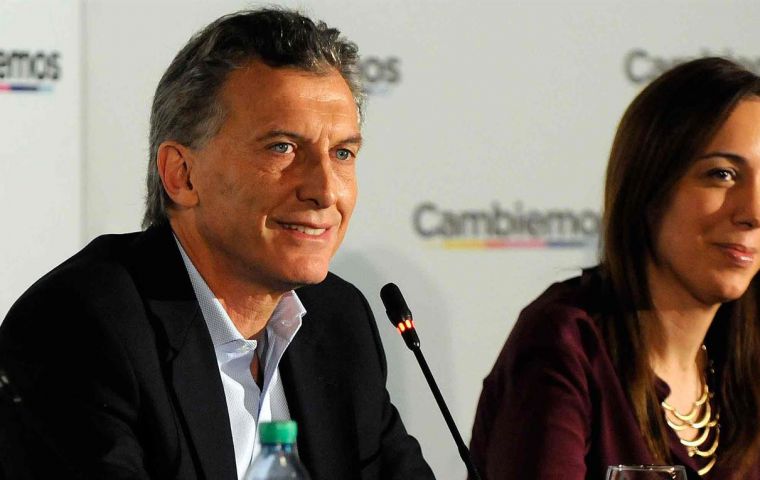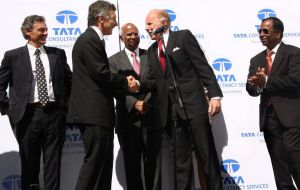MercoPress. South Atlantic News Agency
An Anti-incumbency Vote Whose Effects Will be Seen Beyond Argentina
 The president elect Mauricio Macri next to Maria Eugenia Vidal governor elect of the most important and decisive electoral district in Argentina
The president elect Mauricio Macri next to Maria Eugenia Vidal governor elect of the most important and decisive electoral district in Argentina  Macri, second from left, inaugurating a Tata Consulting Services facility in Buenos Aires in 2009. Ambassador Rengaraj Viswanathan is on the right.
Macri, second from left, inaugurating a Tata Consulting Services facility in Buenos Aires in 2009. Ambassador Rengaraj Viswanathan is on the right.  Macri should be able to a turn around the economy soon, just as President Néstor Kirchner did successfully in 2003.
Macri should be able to a turn around the economy soon, just as President Néstor Kirchner did successfully in 2003.  Although Cristina Fernandez flaunted Argentina’s G-20 membership, she was not taken seriously due to the huge gap between her radical rhetoric and reality
Although Cristina Fernandez flaunted Argentina’s G-20 membership, she was not taken seriously due to the huge gap between her radical rhetoric and reality By Rengaraj Viswanathan (*) Mauricio Macri’s win will inspire the centre-right opposition parties that hope to replace leftist governments in Brazil and Venezuela but it is too early to declare, as some observers are doing, that the result marks the end of the Left in the region
The election of Mauricio Macri as the president of Argentina in the run-off election held on Sunday is a classic anti-incumbency verdict. The Argentine economic situation had been steadily getting worse over the past five years with high inflation, a shortage of foreign exchange, isolation from the global capital markets and low growth. President Cristina Fernández de Kirchner had run out of ideas and had been in denial mode. Her government had resorted to the blatant cooking up of statistics showing single digit inflation while it had been over 20% annually for at least five years. Her antagonism to private sector business, unpredictable policies and arbitrary restrictions on imports and foreign exchange had hurt businesses and the middle class. The poor, who form a solid vote bank of the Peronist party, were hit even harder by inflation and unemployment. Some Peronist voters had, therefore, switched loyalty and decided to give a chance to Macri’s promise for change.
Macri’s supporters hope his market-friendly approach will reboot the economy and revive the industrial and agricultural sectors which had remained paralysed under the command and control approach of the outgoing regime. Macri’s own business background and his track record of running a competent administration during his two terms as mayor of Buenos Aires is likely to restore investor confidence.
No doubt Wall Street will hail Macri as the latest pro-market poster boy of Latin America. The anti-neoliberalism brigade should, however, note that Macri will not be a worse sinner than the Peronist Carlos Saúl Menem, who pursued neoliberal policies including an unsustainable exchange rate regime and wholesale privatisations for a decade only to saddle the short-lived administration of his successor, Fernando de la Rúa, with a crisis of monumental proportions.
Macri should be able to a turn around the economy soon, just as President Néstor Kirchner did successfully in 2003. In fact, Macri’s challenge is much smaller in comparison to what Kirchner faced after the historic crisis and collapse of the economy in 2002. Kirchner should be given full credit for rescuing the Argentine economy quickly with his unorthodox and bold policies and for handing over to his wife Cristina – who succeeded him in 2007 – a reasonably sound economy with robust growth. It is a pity that she mismanaged it, taking the country back almost to the brink of another crisis.
Argentina does not have any serious fundamental problems. It is blessed with a large area of fertile land, abundant water, mineral riches, hydrocarbon reserves and an educated homogeneous population of 42 million. It is free from racial, religious and ethnic conflicts. The current economic problems are basically short-term in nature, caused by the fall in demand and prices of its commodity exports, besides incompetent management.
Impact on Latin America
The foreign policy of the country will undergo a major change under Macri. He will not be friendly to the leftist governments in the region which enjoyed close rapport with presidents Nestor and Cristina Kirchner. He will seek the suspension of Venezuela from Mercosur on the ground that it does not meet the democracy clauses of the group’s charter. He will extend proactive support to the Venezuelan opposition. Of course, Macri cannot afford to displease President Dilma Rousseff too much since Brazil is Argentina’s largest trading partner with lot of mutual investment and stakes. He will, however, shake up Mercosur, which is stuck with an introverted and protectionist mindset. Macri promises to move closer to the Pacific Alliance – Chile, Colombia, Peru and Mexico – which is perceived as a rival to the Brazil-led Mercosur. Macri’s approach to China will be more calibrated, unlike Cristina Kirchner, who wooed Beijing desperately for financial help.
Macri will open up to the United States, the power with which the Kirchners had uneasy relations. The Americans had kept Argentina at arm's length after Néstor Kirchner joined hands with Hugo Chávez during the 2005 Summit of the Americas and killed the US proposal to establish a hemispheric Free Trade Area of the Americas (FTAA). President Cristina craved for an invitation to visit Washington but the Obama administration refused.
Although President Cristina flaunted Argentina’s G-20 membership, the country was not taken seriously due to the huge gap between her radical rhetoric and the reality on the ground. But under Macri, the country will get a higher profile in the global stage, as it did under President Menem.
Macri will certainly continue the Cristina government’s policy of friendly ties and cooperation with India. Conscious of the importance of India as a major market for Argentine exports and as an emerging global power, Macri had visited India in 2010 to get a feel of the country. He spoke warmly about India when he inaugurated the TCS global delivery centre in Buenos Aires in 2009.
Indian exporters and companies with investment in Argentina are excited about the prospects of the further opening of the country’s market under Macri. Argentina, which used to be India’s third largest trading partner in Latin America, is now relegated to sixth rank. India’s exports to Argentina are just about half of its exports to Peru, although Argentina’s GDP is double that of Peru.
The Argentine verdict is likely to serve as an inspiration to the centre-right opposition parties that hope to replace leftist governments in Brazil and Venezuela – both of which are also mired in severe political and economic difficulties. Some Western commentators have hastened to declare that Macri’s victory marks the end of the Left in the region. This is wishful thinking on their part. Centre-right governments have also been voted out of power in recent years in Chile and Nicaragua, where the Left is back after sitting out in the opposition for some time. The same could happen in Argentina too, if Macri does not deliver. He should remember that the previous centre-right government of Fernando de la Rúa was overthrown by mass protests in December 2001, just two years after coming to power, when it was unable to handle the economic crisis. It is performance which matters more than ideology in the Latin America of today.
(*) Rengaraj Viswanathan, a former diplomat, has served as India’s ambassador to Argentina, Uruguay, Bolivia and Venezuela.




Top Comments
Disclaimer & comment rules-

-

-

Read all comments“The current economic problems are basically short-term in nature...”
Nov 25th, 2015 - 09:05 am 0Seriously?
Compared to the problems Europe, Middle East, Africa, and Asia are facing right now (and by extension United States and Australia), due to the current geopolitical developments, yes, the problems are quite mild.
Nov 25th, 2015 - 09:33 am 0I see TTT has given up his disguise.
Nov 25th, 2015 - 10:34 am 0The article highlights just what a disaster CFK has been for Argentina. As I have said so many times, she is incompetent and not at all able to run a country. Nestor had a plan that worked in the short-term given the circumstances he had to deal with. CFK managed OK with her husband telling her what to do. The problem started when Nestor died and her ego was unleashed. She has not a clue because she is a life-long activist. She sacked anyone with any qualifications - because of her paranoia - and replaced them with an army of flatterers.
Even now she is behaving like a prima donna over the hand-over rather than ensuring a smooth transition for the good of the country. It really is, and always has been, all about her.
Commenting for this story is now closed.
If you have a Facebook account, become a fan and comment on our Facebook Page!